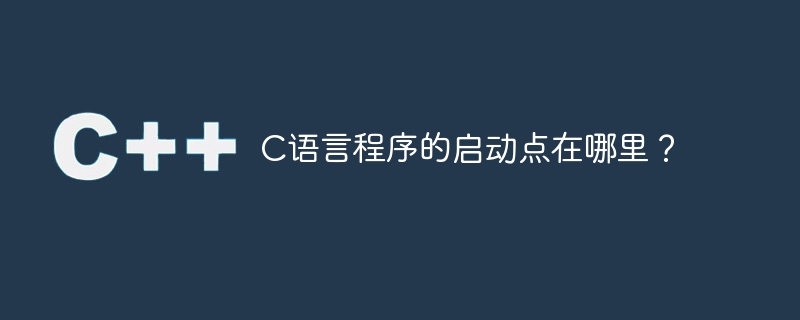Home >Backend Development >C++ >What is the entry function of a C language program?
What is the entry function of a C language program?
- 王林Original
- 2024-02-19 08:31:06940browse

Where is the starting point of the C language program?
C language is a high-level programming language widely used in computer programming. In C language, we often need to write a program with a main function as the entry point of the program. So, where is the starting point of the C language program?
The starting point of C language is the main function. In a C language program, the main function is the entry point of the program. All programs start executing from the main function and will not exit until the end of the main function. C language stipulates the form of main function, which has two common forms:
- int main(void)
- int main(int argc, char *argv[])
The first form of the main function does not take any parameters, while the second form of the main function takes two parameters and is used to receive command line parameters. When we run a C language program, the operating system calls the program's entry function main and passes the command line parameters to the main function before calling the main function.
No matter what form of main function it is, their return value must be of type integer. The return value of the main function can be used to indicate the program execution status. It is usually agreed to return 0 to indicate successful program execution, and return other values to indicate program execution failure.
In C language programs, the main function is not necessary. If a C language program does not have a main function, it cannot be compiled into an executable file. However, in some special cases, we can use a special starting point function instead of the main function. This starting point function is usually called the startup code.
The startup code is a special function provided by the compiler. Its function is to do some preparation work before the program starts executing, such as initializing global variables, checking command line parameters, etc. The naming and specific implementation of the startup code are related to the compiler, and it is often located in the C language runtime library. For C language programs that use the main function as the starting point, the startup code will be executed before calling the main function.
It should be noted that the starting point of a C language program is not necessarily the main function or startup code. In some bare metal environments or special embedded systems, the starting point of the program may be a special address or function, which is slightly different from the standard C language specification. The program execution in this case will be different from the standard C language program, and it needs to be coded according to the specific environment and requirements.
In general, the starting point of a C language program is usually the main function, which is the entry function of the program. By writing the main function, we can write the main logic of the program in it and receive command line parameters as needed. At the same time, in some special cases, we can also use startup code instead of main function as the startup point of the program. No matter what form the program's starting point is, it needs to follow the specifications of the C language to ensure the correct execution of the program.
The main function of C language is the starting point and the end of the program. Its importance is self-evident. Therefore, when writing a C language program, be sure to correctly define and use the main function to ensure normal execution and good maintainability of the program.
The above is the detailed content of What is the entry function of a C language program?. For more information, please follow other related articles on the PHP Chinese website!

